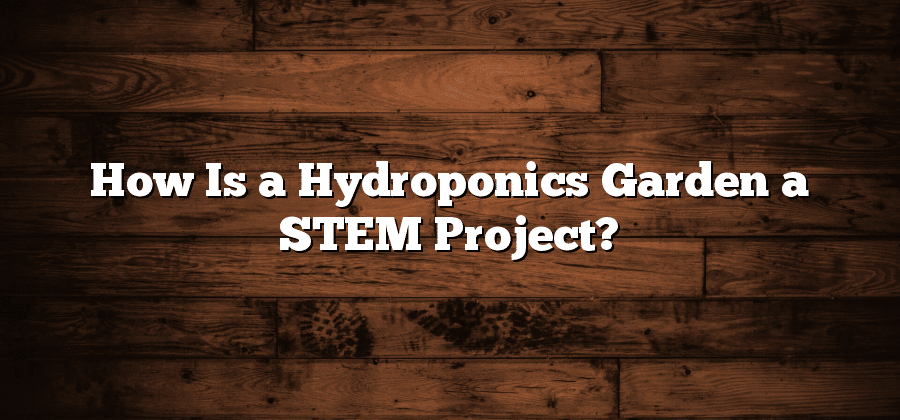Hydroponics Garden and STEM Project Connection
Hydroponics gardens provide a unique and exciting opportunity for students to engage in STEM projects. Through hands-on exploration and experimentation, students can gain a deeper understanding of various scientific concepts and principles. By utilizing hydroponics systems, students can learn about plant biology, chemistry, physics, and environmental science in a practical and dynamic way.
One of the main benefits of incorporating hydroponics gardens into STEM education is the ability to foster critical thinking skills. Students are challenged to analyze data, make connections, and draw conclusions based on their observations and experiments. The controlled environment of a hydroponics garden allows students to manipulate variables and investigate cause-and-effect relationships. This promotes problem-solving skills and encourages students to think creatively in order to improve their crops’ growth and overall system functioning.
Overall, the integration of hydroponics gardens in STEM education provides a unique platform for students to apply scientific principles and engage in hands-on learning. It not only allows students to develop a deeper understanding of various STEM concepts, but also nurtures crucial skills such as critical thinking, problem-solving, and creativity.
Benefits of Hydroponics Gardens in STEM Education
Hydroponics gardens offer numerous benefits for STEM education. Firstly, they provide a practical and hands-on learning experience for students. Instead of simply reading about scientific concepts in textbooks, students can actively engage in the process of growing plants and understand the intricate mechanisms involved. This experiential learning not only enhances their understanding but also sparks their curiosity and enthusiasm for scientific exploration. Through observing and monitoring the growth of plants in a hydroponics garden, students can witness firsthand how factors such as nutrient levels, pH balance, and light intensity affect plant development. This tangible experience helps them comprehend complex scientific principles in a more meaningful way.
Furthermore, hydroponics gardens promote critical thinking and problem-solving skills. Students are encouraged to troubleshoot issues that may arise, such as nutrient deficiencies, pH imbalances, or pest management. By analyzing the symptoms and investigating potential causes, students develop their abilities to identify problems, generate hypotheses, and devise effective solutions. This process requires them to apply their knowledge of chemistry, biology, and other STEM disciplines to address real-world challenges. In addition, the technology involved in hydroponics systems, such as sensors and automated controls, allows students to integrate concepts from engineering and computer science as they design, construct, and optimize their gardens. These interdisciplinary connections foster a holistic understanding of STEM subjects and cultivate skills that are invaluable in the modern workforce.
Engaging Students in Hands-on Learning
Engaging students in hands-on learning is a key component of a successful STEM education. By immersing students in practical experiences, they not only gain a deeper understanding of the subject matter, but also develop crucial problem-solving, critical thinking, and collaboration skills. In the context of hydroponics gardens, this hands-on approach provides students with the opportunity to actively participate in the design, setup, and maintenance of their own miniature ecosystems.
Through engaging with hydroponics gardens, students can apply scientific principles in a practical manner. Concepts such as nutrient absorption, plant growth patterns, and pH levels become tangible as they monitor and adjust the conditions of their hydroponics systems. By observing the impact of these adjustments on plant health and growth, students gain a greater appreciation for the cause-and-effect relationships inherent in scientific processes. This hands-on engagement also promotes a sense of ownership and responsibility, as students take on the role of caretakers for their hydroponics gardens. This experience not only reinforces their understanding of scientific principles, but also enhances their sense of empowerment and self-confidence in their ability to engage with real-world challenges.
Applying Science Principles in Hydroponics Gardens
Hydroponics gardens provide an exciting opportunity for students to apply scientific principles in a hands-on and practical way. Through this innovative approach, students can directly observe and analyze the effects of different variables on plant growth, such as nutrient levels, pH balance, and light exposure. By actively engaging in the process of growing plants in a hydroponics system, students can develop a deeper understanding of crucial scientific concepts, such as photosynthesis and the role of nutrients in plant development.
One key aspect of applying science principles in hydroponics gardens is the ability to conduct experiments and collect data. Students can design experiments to investigate the impact of various factors on plant growth, such as altering nutrient concentrations or adjusting lighting conditions. By doing so, they not only learn about the scientific method but also develop critical thinking skills as they analyze and interpret their collected data. This data-driven approach fosters a sense of inquiry and allows students to draw evidence-based conclusions, enhancing their overall scientific literacy. Moreover, engaging in scientific inquiry within the context of hydroponics gardens encourages students to become active problem solvers, as they must devise solutions to overcome challenges that may arise in plant growth.






